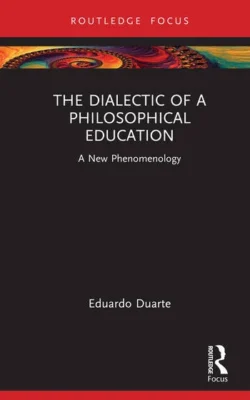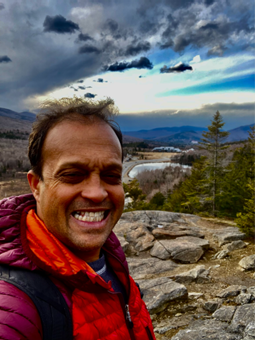Duarte, E. (2025). The dialectic of a philosophical education: A new phenomenology. Taylor & Francis. https://doi.org/10.4324/9781003457879
The Dialectic of a Philosophical Education is a phenomenological description of the studia liberalia as the philosophical learning that occurs in three distinct moments: reading, writing and discussion. Each of these moments is mediated by a significant object of study, specifically, a work from the history of philosophy. The first two moments happen in the solitude of study when the student alone with the work can receive and document ‘whatever essentials’ call out to them, as Heidegger puts it in What is Called Thinking? The third moment, discussion, happens in the company of others when students collectively explore whatever essentials have spoken to each of them and together go improvisationally wherever the dialogue takes them. Together, the three moments of philosophical learning can inspire moments of poetic thinking.
This book is a testimony to the course of study I have offered to my students for over three decades. And, while the course is titled ‘Introduction to Philosophy of Education,’ it is practised as an introduction to the education offered by philosophy. This book is a phenomenological description of the practice of philosophical learning that I have invited my students to experience. A ‘testimony’ is a declaration of truth, usually offered under oath and penalty of perjury. When it appears as testimony, it denotes the law of Moses inscribed on the tablets of stone and even the ark where the fragments of those tablets were held. A testimonial can be a written statement testifying (declaring the truth) to a particular event or the affirmation of another’s character, and it can also refer to a public declaration regarding a religious experience. If we could ‘blend’ and remix these various denotations, we would end up with something that approximates what I have written and am sharing with this book. The reference to the broken tablets is especially important because it speaks to the principal source that my thinking/writing is organised around: quotations, fragments, aphorisms. This book is a sampling and a remixing of the writers, philosophers, critics and theorists I have read with my students for the past three decades. And, thus, it is a work that emerges out of a dialectic between the linear/nonlinear disclosure of thought, a work that moves in circles like the turning of a vinyl record. And the writing is sometimes expressed through scratches and scrubs, moving back and forth, at times, hesitating, and, at other times, unexpectedly introducing a new line of description.
Because this book is a phenomenological description of the course of study that explores philosophy’s call to learn, it attempts to express a philosophical education’s circularity and nonlinear movement. The education offered by philosophy does not have a predetermined ‘outcome.’ To borrow from Nietzsche’s ‘On Self-Overcoming,’ the itinerant movement of a philosophical education takes crooked paths. It is experiential: an experience with meaning encountered in the readings (books/texts) – first, in the solitude of study, and then again (repeated) in the dialogic community of learning. The fragments (quotations) collected from the book/text by the students during study are sampled as aphorisms; they are repeated and repeatedly deciphered, read and reread. This is what an aphorism calls for: to venture on crooked paths of interpretation, to listen for the distinct meanings. Aphorism is from aphorismos, from aphorisein, to distinguish. And this is how this book was written and can be read/heard.
‘Learn to listen, listen to learn.’ That aphorism, which was said again and again by my HS geometry teacher Mr. Klinkenberg, expresses well what this book is describing and, more importantly, how one can learn from philosophy. That aphorism is the keystone of this book. Learn to listen, listen to learn. Listen to this book and you will hear where philosophy and poetry overlap or dialectically perform together. This book is an example of poetic praxis, a work written under the assumption that philosophical language is an essentially poetic phenomenon. As Arendt puts it so eloquently, ‘we are dealing here with something which may not be unique but is certainly extremely rare: the gift of thinking poetically.’ The reception of poetic thinking. That is what I am attempting to describe with this phenomenology of the dialectic of a philosophical education.
While I am not replicating, imitating or even borrowing from him, the philosophical learning described in this book is heavily influenced by Walter Benjamin, who had an ‘ideal of producing a work consisting entirely of quotations.’ Hannah Arendt, whose voice is heard throughout this book, described how Benjamin used quotations. His use of quotations, she tells us, ‘distinguishes his writings from scholarly works of all kinds in which it is the function of quotations to verify and document opinions…. This was out of the question in Benjamin.’ As described in this book, a philosophical education revolves around the disclosures of fragments that call out to students during study. The collection of whatever essentials call out to each student during the solitude of study is then shared and discussed with others in a dialogic learning community. These fragments take on a new life, as if they were heard for the first time. Borrowing from the discourse of hip-hop, these fragments are clipped and sampled in a way that scratches (negates, strikes or even cancels) the context to reveal what was originary when it was originally written as a flash of inspiration.
Benjamin’s thinking/writing followed the path of the collector who gathered significant objects for his cabinet of curiosity. But Benjamin was also a proto-hip-hop thinker/writer. As Arendt puts it: ‘The main work consisted in tearing fragments out of their context and arranging them afresh in such a way that they illustrated one another and were able to prove their raison d’être in a free-floating state, as it were.’ To describe him as a proto-hip-hop thinker/writer is to recognise the artistic and spiritual dimension of Benjamin’s work. Like hip-hop, which is rooted in the history of the struggle for liberation through art, specifically music, Benjamin’s project was a quest for authenticity in a world choked by meaningless clutter. Quotations offer fragments of authenticity, moments of meaning, analogous to how music discloses freedom. As Arendt puts it, ‘from the beginning, the problem of truth’ for Benjamin was the problem of listening for authenticity. ‘Revelation,’ according to Benjamin, ‘must be heard’ because ‘it lies in the metaphysically acoustical sphere.’ For Arendt, the implication was obvious: ‘What else does this mean than that he understood language as an essentially poetic phenomenon?’
Learn to listen, listen to learn. Listening requires that we shut our mouths and hold our breath. This is also required if and when we swim below the surface and explore what remains hidden from the superficies. Arendt reminds us that the rare gift of poetic thinking is happening in the present (the moment), but ‘works with the ‘thought fragments’ it can wrest from the past and gather about itself.’ Those who receive this gift and share (regift) it with others are likened to pearl divers who descend ‘to the bottom of the sea, not to excavate the bottom and bring it to light but to pry loose the rich and strange, the pearls and the coral in the depths, and to carry them to the surface.’ To listen for significance, to study and discuss what appears authentic and meaningful is to learn from a past that circulates in the present and arrives as something new, enlivening what for many students can feel like a dead end, schooling as the place where originality runs aground. Away from the shore, the pearl diver swims deep below the surface. Likewise, the students who venture into philosophical reading, writing and discussion. They learn to listen and listen to learn from the poetic thinking they receive. Like the pearl diver, they recover samples of significance and ‘bring them up into the world of the living – as ‘thought fragments,’ as something ‘rich and strange,’ as perhaps even as everlasting Urphänomene.’



